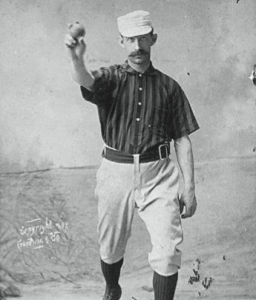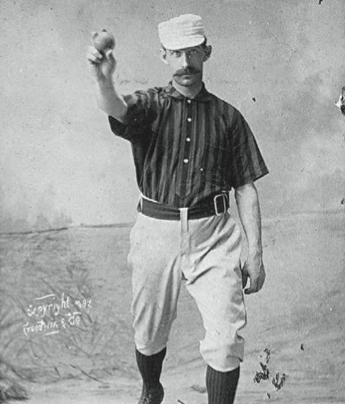May 13, 1896: Playing until dark: Beaneaters get best of Colts
 “Timothy Keefe, umpire, cold-bloodedly gave a game of baseball to Boston yesterday,” wrote the Chicago Tribune about a weird game with Boston in the Windy City on May 13, 1896.1 While the Tribune slammed the umpire, its rival Chicago newspaper the Inter Ocean placed no blame on Keefe but called the game “the funniest series of absurdities ever seen on a ball field.”2 The Boston Globe had no problem with Keefe, but declared, “Seldom has a baseball crowd at the league grounds manifested its anger so vehemently.”3 No matter what the interpretation, this early-season contest did not factor into the 1896 pennant as both teams finished well behind Baltimore. At the time, however, only 4½ games separated nine of the 12 teams in the National League. Chicago was only 1½ games behind and Boston two games behind the surprising Philadelphia Phillies.
“Timothy Keefe, umpire, cold-bloodedly gave a game of baseball to Boston yesterday,” wrote the Chicago Tribune about a weird game with Boston in the Windy City on May 13, 1896.1 While the Tribune slammed the umpire, its rival Chicago newspaper the Inter Ocean placed no blame on Keefe but called the game “the funniest series of absurdities ever seen on a ball field.”2 The Boston Globe had no problem with Keefe, but declared, “Seldom has a baseball crowd at the league grounds manifested its anger so vehemently.”3 No matter what the interpretation, this early-season contest did not factor into the 1896 pennant as both teams finished well behind Baltimore. At the time, however, only 4½ games separated nine of the 12 teams in the National League. Chicago was only 1½ games behind and Boston two games behind the surprising Philadelphia Phillies.
Two veteran pitchers took the hill as Boston’s Jack Stivetts opposed Chicago’s Adonis Terry. Keefe, in his third year as a National League umpire, had won 342 games in his 14-year pitching career, retiring as a player in 1893. Cap Anson, in his 21st year as Chicago’s player-manager, was not in the lineup this day, but quickly made his presence felt.
Boston batted first. With one out, Billy Hamilton singled to left and went to second on Herman Long’s walk. Hugh Duffylined a single to right, scoring Hamilton. Long scored as he and Duffy manufactured a double steal and shortstop Bill Dahlen threw wide to the plate. Charlie Ganzel then hit a grounder to Dahlen, who made another error when his wild throw pulled George Decker off the bag at first. Duffy scored, and Boston led 3-0. Chicago countered in the bottom of the inning with two runs. Shortstop Long mishandled a grounder by Bill Everitt, who scored on Dahlen’s triple. Dahlen scored on Bill Lange’s groundout.
The Beaneaters’ 3-2 lead remained that way until their sixth inning. Ganzel singled and took second when a thundering Duffy was thrown out at the plate. Ganzel scored “like an exploded bottle of ‘Anson’s ginger ale’”4 on Tucker’s single and Boston led 4-2.
The Colts had only one hit off Stivetts when they batted in the bottom of the sixth. Everitt lined a shot down the third-base line. As Everitt rounded first, Tommy Tucker “threw his arms around his neck and the two spun around together,” the Tribune reported. Enraged, Everitt pulled himself out of the embrace and was ready to go at it with Tucker. Keefe came running in to intervene when the ball was thrown in to second baseman Bobby Lowe, who tagged Everitt, still locked up with Tucker. “You’re out!” cried the huffing Keefe as “the crowd broke into loud denunciations of the manifestly unfair decision,” the newspaper wrote. “Three thousand people saw the interference; only the umpire did not see it, though when he ran up to them the men were locked in each other’s arms and standing not two yards from first base.” Players gathered around Keefe to argue but he was “deaf to reason or argument,” according to the Tribune.5
Play continued as Dahlen clobbered a drive “into the new seats in right field”6 and Keefe awarded him a triple. Anson went nuts. “In vain did he uplift his hands, stamp the ground and bellow”7 as he argued that it was a home run. Keefe’s ruling was that a hit into the empty seats was a ball in play and “would count for what could be made,”8 since the outfielder had a chance to retrieve it. If the seats were occupied the ball would have been ruled a home run. The crowd was even more irate now. The Boston Globe noticed “one fat man [who] waddled down the main aisle of the grand stand and pleaded with those about him to go on the field and do violence to Keefe.”9 Fortunately, no one did such. Dahlen did not score, so the game remained 4-2. Fans continued verbally assaulting Keefe and Tucker for the remainder of the game.
The score remained 4-2 as Chicago batted in the bottom of the ninth. Lange made first on a screaming liner that Stivetts couldn’t corral, then made it to third on a bloop single to center by Jack Ryan. Harry Truby lofted a high fly to Hamilton in center. Both runners tagged, Ryan taking third and Lange scoring. Decker grounded out to first with Ryan scoring the tying run. The game was now 4-4 after nine innings.
Boston players insisted that the game had to end in a tie because they needed to catch a train for Pittsburgh, but Anson refused the request. Hamilton singled and stole second base as Long interfered with catcher Tim Donahue’s throw. In the confusion, Hamilton took third. Long and Lowe were retired on grounders and Hamilton held at third. Duffy and Ganzel walked to load the bases, but Boston did not score as Terry got out of his “ticklish business.”10 Chicago was blanked in its half of the 10th. Both pitchers were still strong, the Inter Ocean surmising, “Both Stivetts and Terry held to their cunning as closely as a half done griddle cake sticks to a bald head.”11 But they were just getting started.
In the 11th, Joe Harrington, Stivetts, and Jimmy Bannon reached on hits for Boston and they all scored on Hamilton’s triple. Anson now realized his only path to victory was in the setting sun. The game would be called and revert back to the 10th-inning tie. Anson felt he could protest the game with Nick Young in the National League office because of the interference play and the “home run” non-call.12 He ordered his team to stall and wait for darkness.
Hamilton scored when Long’s grounder went by a motionless Dahlen. Long stole second and third without any effort, then scored on Donahue’s bad throw. Chicago players began to tie their shoes, one right after the other. Donahue “succeeded in finding more things to do, besides catch, than any man on the diamond,” the Inter Ocean wrote.13 He tied his shoes (wishing he was a quadruped, in the Inter Ocean’s opinion), got a drink of water, and then hunted for a handkerchief to wipe his mouth. Then he conveniently forgot where he put his mask. “It seemed strange,” the Inter Ocean wrote, “that a big hard mask could disappear on a level field, but that one had.”14 Donahue was going to investigate the grandstand when it was discovered hiding in a corner. Terry couldn’t find the ball. After five minutes it was recovered but players had a hard time getting it back to him, overthrowing each other for a few minutes.
Terry finally was finally ready to pitch and lobbed the ball in. The Boston hitter connected and made a modern-day “Little League home run” as Chicago fielders kept throwing the ball all over the place. They probably were watching the sun set because six more Boston batters scored in similar fashion. Keefe refused to call the game for darkness; instead, he had enough of this foolishness and turned to the crowd. “This game is given to Boston by a score of nine to nothing,” he bellowed, giving the regulation score for a forfeited game. The crowd roared angrily and Anson approached Keefe, protesting the game.
If Anson had allowed the Boston team to go and catch their train, the game would have been a tie, and none of this would have happened. “There are black and blue spots on his anatomy where he has kicked himself since those rash words,” wrote the Inter Ocean.15 “Anson is the same old child on the diamond,” commented the Boston Journal.16 While the game was ruled a 9-0 forfeit, for records purposes it was a Boston 10-4 win. No matter what gripes Anson had, the game was not overruled by Young, and Keefe was not disciplined.
Nearly 70 years later, Tim Keefe was posthumously inducted into the Baseball Hall of Fame for being one of the greatest pitchers of the nineteenth century. His umpiring career, however, ended two months later. “Once a great pitcher,” John B. Foster in Sporting Life wrote, “but the game got away from him. The players, with few exceptions, no longer respected his authority, and life would have been more or less miserable constantly.”17
Boston players grabbed a “later and slower train,” according to the Boston Post. “They are sore over the loss of two games here [in Chicago].”18 But they won the series finale, odd as it was.
Sources
In addition to sources listed in the Notes, the author also used the following for game information:
Bevis, Charlie. “Tim Keefe,” SABR BioProject. Retrieved May 7, 2017. sabr.org/bioproj/person/6f1dd1b1.
Notes
1 “Umpire Keefe Wins It,” Chicago Tribune, May 14, 1896: 4.
2 “Wished for Night,” Inter Ocean, May 14, 1896: 4.
3 “Anson’s Idea,” Boston Globe, May 14, 1896: 4.
4 “Wished for Night.”
5 “Umpire Keefe Wins It.”
6 Ibid.
7 “Anson’s Idea.”
8 “Umpire Keefe Wins It.”
9 “Anson’s Idea.”
10 “Wished for Night.”
11 Ibid.
12 At least in the opinion of the Inter Ocean.
13 “Wished for Night.”
14 Ibid.
15 Ibid.
16 “Played Baby,” Boston Journal, May 14, 1896: 4.
17 John B. Forster, “Brooklyn Budget,” Sporting Life, July 25, 1896: 6.
18 “Anson Quits,” Boston Post, May 14, 1896: 3.
Additional Stats
Boston Beaneaters 10
Chicago Colts 4
11 innings
West Side Grounds
Chicago, IL
Corrections? Additions?
If you can help us improve this game story, contact us.


